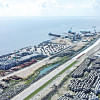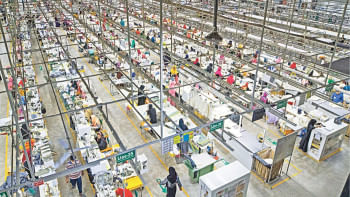Blow for private economic zones, hi-tech parks as tax benefits go

Investors and developers of private economic zones (EZs) and hi-tech parks are going to lose the 10-year-long tax waiver on their incomes from the next fiscal year as the government phases out exemptions.
Bangladesh has embarked on the process of ending tax exemptions gradually in all sectors with a view to lifting the country's low tax-to-GDP ratio and aligning them with global rates since the country will not be able to offer generous tax benefits and subsidies in the current form after it becomes a developing nation in 2026.
While unveiling the budget for the upcoming fiscal year on Thursday, Finance Minister Abul Hassan Mahmood Ali gave the direction on cutting exemptions. As such, the government is going to provide the waiver to state-run hi-tech parks and economic zones alone.
"The NBR has curtailed the facilities for the next fiscal year with the objective of coming out of the culture of tax breaks," said a senior official of the National Board of Revenue (NBR), seeking anonymity.
The move comes at a time when the government is under pressure to enhance revenue collections to finance public expenditures and reduce its reliance on borrowing.
Bangladesh has one of the lowest revenue-to-GDP ratios in the world, and the International Monetary Fund, as part of its $4.7 billion loan, has given a condition to the government to increase tax collections by 0.5 percent of the GDP.
As part of the government's efforts to spur industrialisation, augment export earnings, and create jobs through the setting up of 100 economic zones across the country, the Bangladesh Economic Zones Authority (Beza) has already granted approvals to establish 29 private economic zones. Of them, eight are already operational.
Besides, there are 13 private hi-tech parks.
Currently, investors in the EZs and hi-tech parks qualify for a tax break for a decade starting from the first year of their operations. They are entitled to a full tax waiver in the first three years.
They were granted an 80 percent tax waiver in the fourth year, 70 percent in the fifth year, and 60 percent in the sixth year. It was supposed to decline by 10 percentage points in each subsequent year before standing at 20 percent in the 10th year.
Investors also lost the zero-duty benefit on the import of capital machinery, components and construction materials in FY25. As a result, firms operating in the industrial enclaves will have to pay 1 percent customs duty.
In 2021-22, economic zones and hi-tech parks jointly enjoyed tax exemptions amounted to Tk 4,022 crore, NBR data showed. The government has estimated that direct tax expenditures will total Tk 163,000 crore in FY25.
Investors have expressed deep concerns about the benefit cut, saying this will hamper sectoral growth and stand in the way of attracting domestic and foreign direct investments.
"This type of policy change will not be effective in attracting FDI," said Rupali Chowdhury, managing director of Berger Paints Bangladesh Ltd.
This will discourage the investors who have already set up factories in the EZs or are planning to establish units, she said.
She alleged that the investors who had secured land in the EZs were given a bad signal since they would not reap the benefits as promised by the Beza.
Chowdhury said Bangladesh is not the only destination for investments in the world. Therefore, investors will go to the countries where they will receive more facilities.
Central bank data showed Bangladesh received $3.004 billion in FDI last year, a fall of 14 percent from $3.5 billion in 2022.
Mohammad Zaved Akhtar, president of the Foreign Investors' Chamber of Commerce and Industry, said the new provision will send a wrong signal to international investors.
"It will reduce our competitiveness in attracting investments."
Bangladesh can attract $2 billion to $3 billion in FDI every year while Vietnam pulls $15 billion, according to him.
Speaking to The Daily Star, an official of the Bangladesh Hi-Tech Park Authority said it would write to the NBR, requesting it to continue the benefits because the purpose of setting up hi-tech parks hasn't fulfilled yet.
"It will hinder the growth of these companies."
Paban Chowdhury, chief adviser of City Group, said private economic zones and hi-tech parks have been established on the back of the benefits.
"The discontinuation will severely affect this progress and will have a serious implication for the country's economic growth and technological advancement."
The conglomerate has an economic zone as well as a hi-tech park.
"Hi-tech parks are already struggling in terms of investments," said Russell T Ahmed, president of the Bangladesh Association of Software and Information Services.
"Such a move also contradicts the government vision," he said, urging the government to retain the benefits.
Shaikh Yusuf Harun, executive chairman of the Beza, said it has already requested the Prime Minister's Office and the NBR to keep the existing benefits on income tax, customs and value-added tax.
"The government will make necessary decisions in this regard considering the planned industrialisation and to accelerate the flow of investments."


 For all latest news, follow The Daily Star's Google News channel.
For all latest news, follow The Daily Star's Google News channel. 








Comments